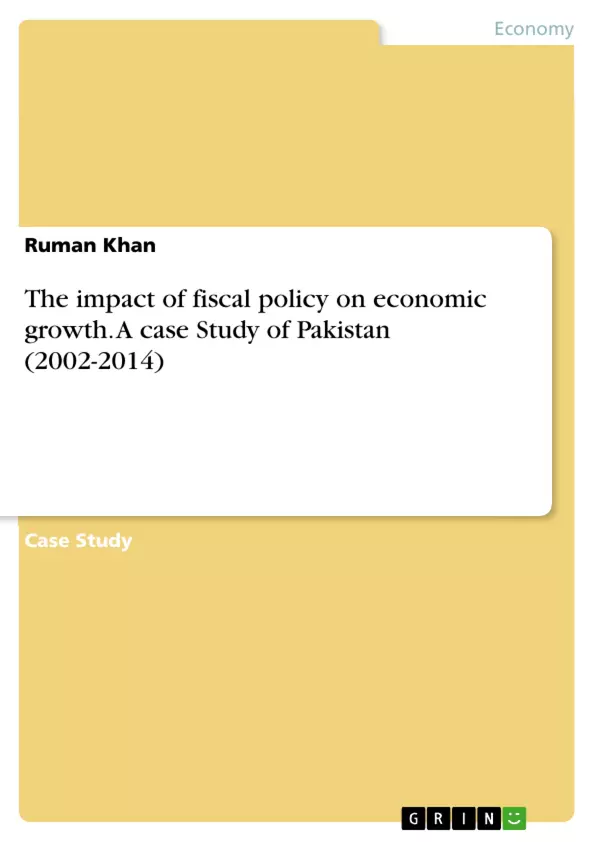In this study we will assess the impact of fiscal policy on economic growth during the period of 2002-2014. The data of the study will be collected from economic surveys of Pakistan various editions, statistical supplements and Budget documents. To check the stationarity of the data, computer software will be used for a fitting auto-regressive time series model. The study is designed as follows: Literature available on this topic is analyzed in section two, objective of the study, hypothesis of the study, model fitting, source of data, methodology, conclusion and references are presented in chapter three, four, five, six, seven and eight respectively.
Fiscal policy is the effective and practical policy of all governments. Under fiscal policy a government uses its expenses or expenditures (developmental and non-developmental) and revenues (taxes and non-taxes) to produce desirable effects on economic activities and avoid undesirable ones on the national income, production and employment opportunities in a country. It also plays a vital role in the leading overall economic activities. According to F.R.Glahe (1985), “By fiscal policy is meant the regulation of the level of government expenditure and taxation to achieve full employment without inflation in the economy”.
If the mass community of a country have an access to comparatively superior and abundant commodities, if the per capita income is accumulative, if the lives of the public are becoming easier and luxurious and if value added commodities are available in the market over a long period of time then it means that the country is economically growing and economic growth is taking place. As economic growth is a multidimensional phenomenon. It depends upon a large number of macro inputs. It is affected by various variables and lays impact upon different social and economic indicators. Therefore, it becomes laborious and even impossible to analyze behaviors of those variables in a single research. Therefore the researcher decided to see the behavioral changes brought by Total Revenue, Total Expenditure, Current Expenditure, Defense, Interest Payment and Development Expenditure in economic growth. Their impacts are analyzed upon economic growth.
Frequently asked questions
What is the study about?
The study assesses the impact of fiscal policy on economic growth, particularly focusing on the case of Pakistan between 2002 and 2014. It analyzes the relationship between economic growth and several fiscal variables.
What fiscal policy variables are considered in the study?
The study considers the following independent variables: Total Revenue, Total Expenditure, Current Expenditure, Defense spending, Interest Payments, and Developmental Expenditure.
What is the methodology used in the study?
The methodology includes testing for the stationarity of data using autoregressive time series models. T-statistics and ANOVA are used to determine the relationship between fiscal policy and economic growth. Computer software is used for analysis.
What is the hypothesis of the study?
The study tests the following hypothesis:
- H0: Fiscal policy does not cause economic growth.
- H1: Fiscal policy causes economic growth.
What data sources were used?
Data was collected from the Economic Survey of Pakistan (various editions), statistical supplements, and budget documents.
What are some of the literature reviews mentioned in the HTML Document?
The literature review includes studies by Giavazzi and Pagano (1990), de Cos and Moral-Benito (2013), Barro and Sahaskul (1993), and Barro (1990), Levin and Renelt(1992), Xu (1994), Engen and Skinner (1996). Other economisits include: Derin (2003), Shantayanan et al. (1993), Bleaney et al. (2001), Kneller et al.(1999),Devarajan.et al. (1996),Gupta et al. (2005), Benos (2004), Ghosh and Gergoriou (2006), Appah (2010), Medee and Nendee (2011), Hogan (2004), Mahran (2005) and others.
What are the policy recommendations suggested?
Policy recommendations include:
- Exploiting resources that stimulate economic growth.
- Concentrating on developmental expenditures for economic growth.
- Considering current expenditure and defense spending's potential impacts on growth.
What are the key findings about the relationship between individual fiscal policy variables and economic growth?
Total Revenue, Total Expenditure, Current Expenditure, and Defense spending showed strong individual impacts on economic growth according to T-values. Interest Payment and Developmental Expenditure exhibited weaker links.
- Quote paper
- Ruman Khan (Author), 2016, The impact of fiscal policy on economic growth. A case Study of Pakistan (2002-2014), Munich, GRIN Verlag, https://www.hausarbeiten.de/document/337248


